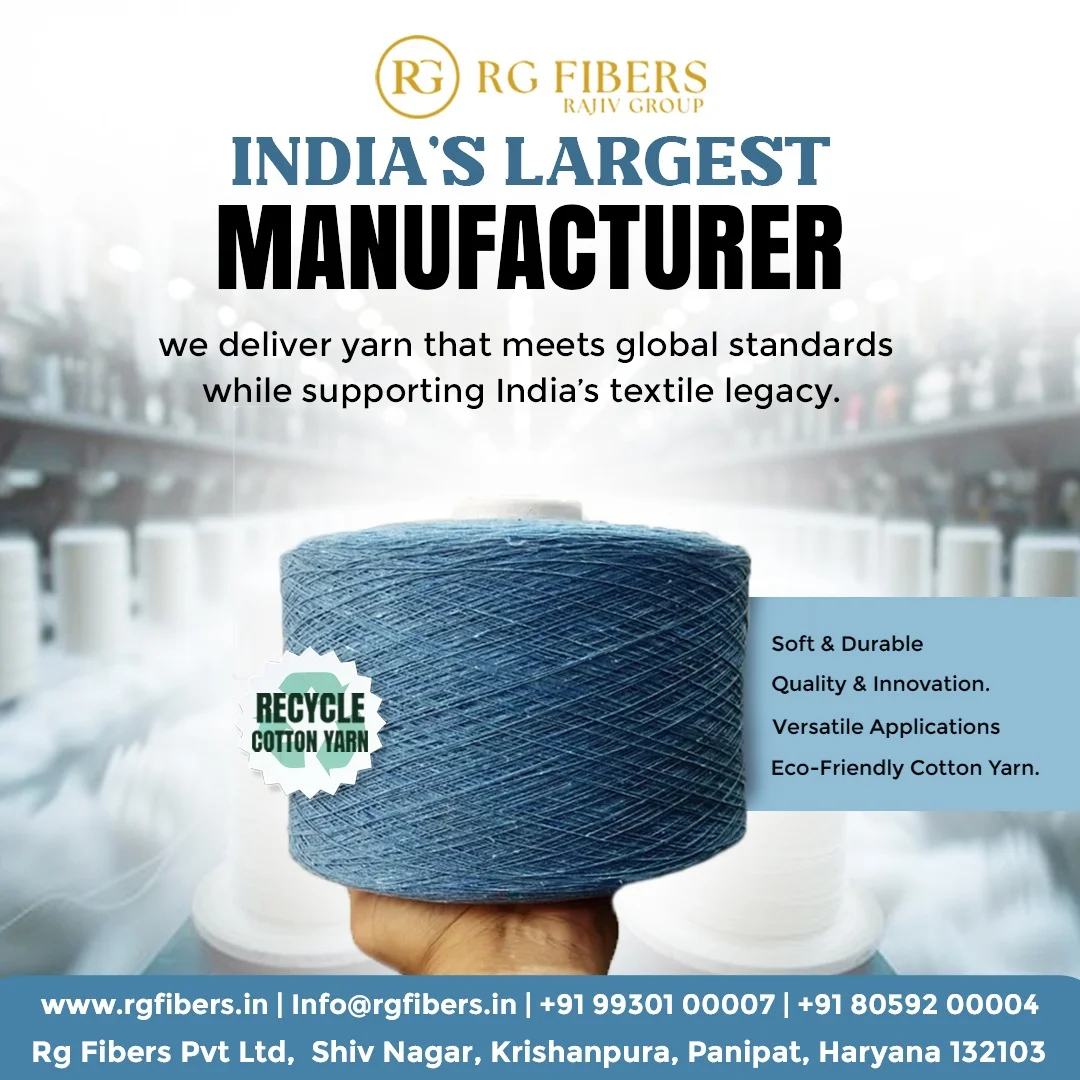In an era where sustainability is no longer a trend but a necessity, the textile industry is undergoing a much-needed transformation. At the forefront of this change is recycled yarn—a powerful innovation reshaping how we produce fabrics, reduce waste, and conserve precious resources like water. For both environmentally conscious consumers and businesses, understanding the impact of recycled yarn is vital.
This article explores how recycled yarn manufacturers play a pivotal role in reducing water usage and textile waste while meeting the rising demand for eco-friendly alternatives.
💧 The Water Crisis in Textile Production
Water is an essential part of conventional textile manufacturing, especially in the production of virgin cotton and synthetic fibers.
-
A single cotton t-shirt can require over 2,700 liters of water to produce—equivalent to what one person drinks in 2.5 years.
-
Dyeing and finishing fabrics are among the largest water polluters globally, releasing toxic effluents into freshwater sources.
-
The synthetic fiber industry also consumes massive amounts of water in cooling, processing, and cleaning operations.
With global freshwater resources shrinking and water scarcity affecting millions, the fashion and textile industry is under pressure to adopt sustainable practices.
♻️ What Is Recycled Yarn?
Recycled yarn is yarn produced from discarded or post-consumer textile waste, factory cuttings, or recycled PET plastic bottles. These materials are collected, sorted, cleaned, shredded, and spun into new yarns. The process avoids many of the resource-heavy steps involved in producing virgin fibers.
There are mainly two types of recycled yarns:
-
Recycled Cotton Yarn: Made from cotton waste or used garments.
-
Recycled Polyester Yarn: Made from plastic bottles or polyester scraps.
Top recycled yarn manufacturers now also offer blended solutions combining recycled cotton with other sustainable materials for added durability and flexibility.
💧 How Recycled Yarn Reduces Water Usage
One of the most compelling advantages of recycled yarn is its dramatic reduction in water usage during production. Here’s how:
1. No Need for Water-Intensive Agriculture
Virgin cotton requires irrigation, pesticides, and fertilizers—all of which strain water resources. In contrast, recycled fiber yarn eliminates the need for cultivation, cutting water usage by up to 90%.
2. Eliminates Dyeing in Some Cases
Recycled yarns made from pre-colored textiles or fibers can often be reused without re-dyeing. This not only saves water but also prevents dye-related pollution.
3. Less Water in Processing
Since the fibers have already been processed once, the spinning and preparation stages require significantly less water compared to virgin fibers.
✅ According to industry data, producing recycled yarn can save 20,000 liters of water per kilogram of yarn compared to virgin cotton yarn.
🗑️ How Recycled Yarn Reduces Textile Waste
The fashion industry generates over 92 million tonnes of textile waste every year. Most of this ends up in landfills or incinerators, releasing harmful chemicals and greenhouse gases.
1. Gives New Life to Discarded Materials
Recycled yarn production collects waste from:
-
Post-consumer garments
-
Industrial textile scraps
-
PET plastic bottles
Instead of ending up in the trash, these materials are converted into usable yarns—reducing the volume of global textile waste.
2. Supports Circular Economy
Recycled yarn is a crucial pillar in the circular fashion economy. By converting waste into raw material, yarn manufacturers create a closed-loop system that minimizes waste and maximizes resource efficiency.
3. Reduces Landfill Dependency
Every kilogram of recycled yarn helps avoid dumping or burning textiles, reducing pressure on landfills and lowering CO₂ emissions.
🧵 The Role of Recycled Yarn Suppliers
Trusted recycled yarn suppliers and recycled yarn manufacturers like Rajiv Group are redefining how sustainable textile production is done. Their operations often include:
-
GRS (Global Recycled Standard) certifications
-
In-house recycling facilities
-
Low-impact dyeing technologies
-
Transparent supply chain practices
Whether you’re a clothing brand, textile mill, or home décor producer, working with a certified yarn manufacturer specializing in recycled yarn helps ensure that you are contributing positively to the environment while maintaining product quality.
Read More at https://repurtech.com/
🌍 Environmental Impact Snapshot
| Impact Area | Virgin Yarn | Recycled Yarn |
|---|---|---|
| Water Usage | Extremely High | Up to 90% Less |
| CO₂ Emissions | High | Reduced |
| Energy Use | High | Moderate |
| Waste Generated | Adds to Landfills | Prevents Waste |
| Eco-Certification | Optional | Often Mandatory |
🧶 Real-World Applications of Recycled Yarn
Recycled yarn isn’t just a niche product anymore. It is now widely used in:
-
Fashion & Apparel: Sustainable t-shirts, jeans, hoodies, and accessories.
-
Home Furnishing: Curtains, rugs, cushion covers, etc.
-
Industrial Textiles: Upholstery, car seat fabrics, etc.
As demand for sustainable products grows, so does the use of recycled fiber yarn in mainstream production.
✅ Final Thoughts: The Smart & Sustainable Choice
Recycled yarn is not just an eco-friendly trend—it’s a long-term solution to some of the textile industry’s biggest challenges. By drastically reducing water usage and reusing textile waste, it helps pave the way toward a greener and cleaner future.
If you’re a brand, distributor, or fabricator, now is the time to partner with a trusted recycled yarn supplier who aligns with your sustainability goals. Whether you’re looking to minimize your environmental footprint or meet customer demands for green alternatives, recycled yarn manufacturers like Rajiv Group offer the expertise and innovation needed to make that transition seamless.
📢 Call to Action
Looking for high-quality recycled yarn at scale?
Contact Rajiv Group, a leading recycled yarn supplier, and take your first step toward sustainable production today.
Read More at https://repurtech.com/
